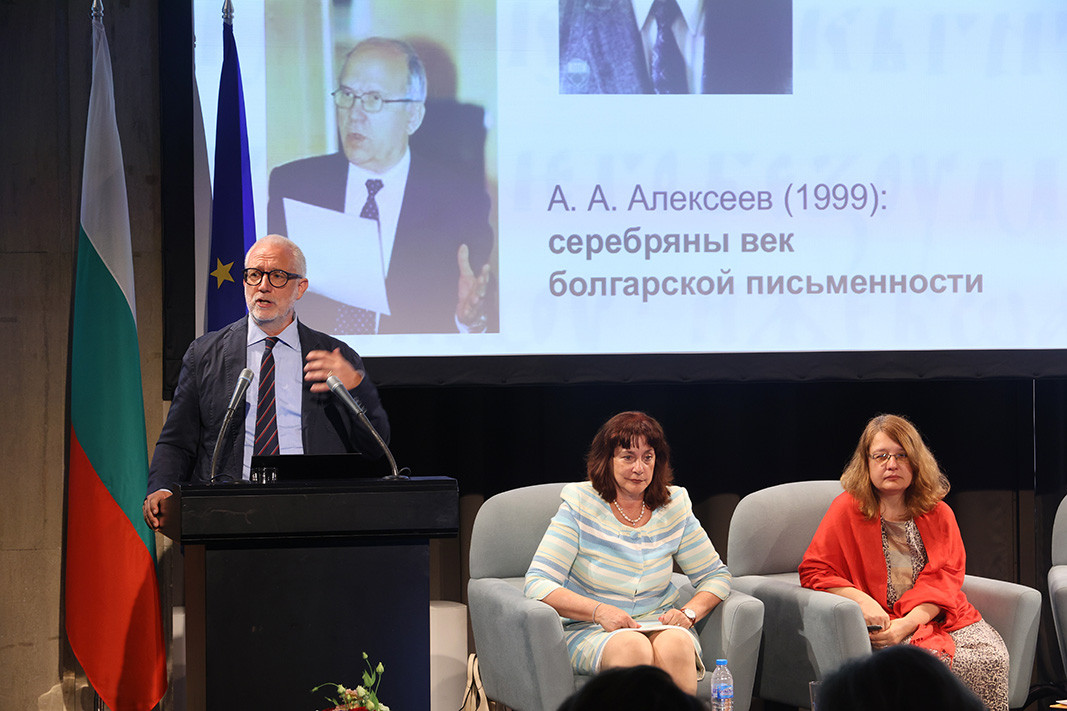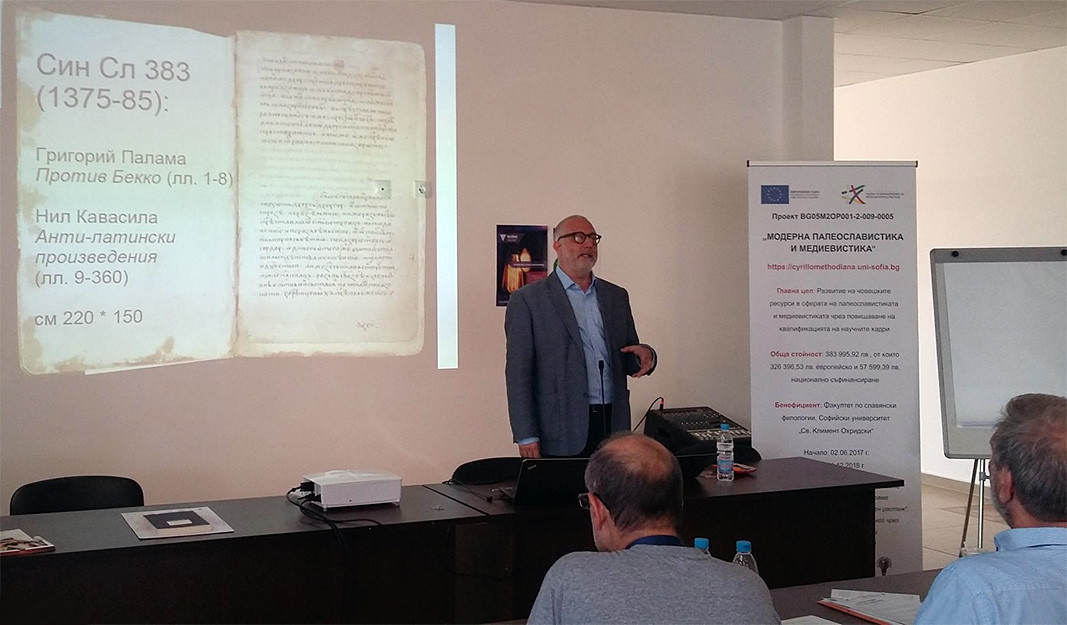Assoc. Prof. Marco Scarpa studies Cyril and Methodius’ legacy and the role of the Southern Slavic scriptoriums, and the 14th century men of letters who worked there for the flourishment of culture in the Balkans. He is also interested in the repercussions of the cultural advancement in Bulgaria and Byzantium within the cultural domain which the Italian expert in Bulgarian studies Riccardo Picchio calls “Slavia Orthodoxa”. Not long ago, Marco Scarpa took part in an international forum about the Cyrillic alphabet in Sofia and Plovdiv – Alphabet. Language. Identity.
“It is very important to lay emphasis on the role of the alphabet which millions of people around the world use,” says Assoc. Prof. Marco Scarpa, who has a strong bond with Bulgaria – professionally and personally. He says he is an expert in Slavonic studies with scientific interests that traced his road to Bulgaria.
“My first Slavic languages were Russian and Serbian,” he says. “When I started working on medieval manuscripts I found I needed Bulgarian. I came to Bulgaria and my first teacher said to me that seeing as I spoke two Slavic languages, my third language would be free. That free Bulgarian language was so important to me that I spent several years working at the Bulgarian Academy of Science’s Cyril and Methodius Research Center. Even my wife is Bulgarian, so I have a very strong bond with Bulgaria.”
Assoc. Prof. Marco Scarpa’s latest work has been the study of manuscripts from the time of Tsar Ivan Alexander who ruled the Bulgarian lands from 1331 until 1371. “There is still a lot of material that needs to be studied,” he says.
“Interestingly, compared to the Serbian manuscripts, the Bulgarian manuscripts are maybe half that number, and this is probably an indication that Bulgaria was conquered by the Ottoman Turks before Serbia, and many of them were destroyed with the destruction of the monasteries,” Assoc. Prof. Marco Scarpa says. “One more important thing is the cooperation between philologists and IT experts so we can avail ourselves of new technologies, and of the experience and the knowledge of experts from various spheres. At the moment, with the help of computer science, we are working on describing the handwriting of the copyists even though in Slavic paleography there is no generally recognized methodology for this.”
Assoc. Prof. Marco Scarpa says his own research work, and that of his colleagues is not so much some kind of nostalgia for the past as the groundwork for building a better future for Bulgaria, for Europe and for the whole world. “Because the future is based on our knowledge of the past,” he explains. The scholar says he sees Europe as a polyphony of languages, and adds that Bulgaria has made its own contribution to this diversity of voices. 
“The identity of a nation is its language,” says Assoc. Prof. Marco Scarpa. “Language unites people, and the alphabet is the way to fix this. However, language and alphabet should not serve for confrontation, they should be valued as a shared wealth. If we use just one language – for example, English – we grow poorer. We shall be wealthier when we collect different languages and alphabets, and that is a sound principle of the European Union.”
Unfortunately, fewer and fewer universities in other countries have Bulgarian studies, Marco Scarpa says, in confirmation of the data presented at the conference on the Cyrillic alphabet.
“Fortunately, in Italy, at almost all universities where Slavic languages are taught, students also study something called Slavic Philology (Filologia slava) which comes very close to Old Bulgarian studies,” he adds. And that affords them an opportunity to get acquainted with the things that existed in the Bulgarian lands – a key element for the Slavic languages are the alphabet and the literary production here. I can see my students are interested in Bulgaria and in old Bulgarian tradition, and there are two girls, who are not even studying Bulgarian, who will come for the summer paleography school - to contribute to the scientific goals of the forum, but also to become ambassadors of the Cyrillic alphabet “like us all”, Assoc. Prof. Marco Scarpa says.
More:
Translated and posted by Milena Daynova
Photos: Diana Tsankova, BTA, Facebook / Marco Scarpa
Krasimir Karailiev was born in Slovakia, but his ancestry is from Bulgaria. He is a descendant of Bulgarian gardeners, whose fame spread to a number of European countries towards the end of the 19th and in the first half of the 20th century. The memory..
Born at the end of 1989 in Sofia, he is a child of the transition period in Bulgaria. He grew up with kung fu movies and the mysticism of the Shaolin Monastery in China. His path passed through aikido training, The National Academy of..
Dimitar Dimitrov breeds goats, fruit trees, California worms and, until recently, horses. But now his greatest love is peacocks. In the village of Susam in the Haskovo region, he looks after 300 large and 200 small colourful birds of 26 varieties,..

+359 2 9336 661
